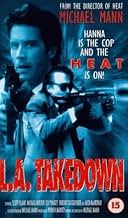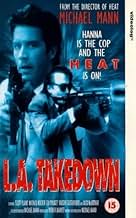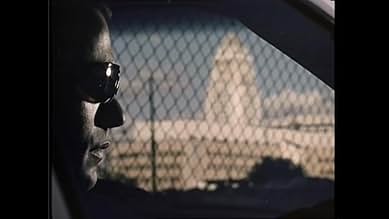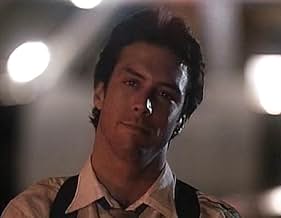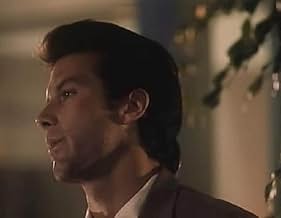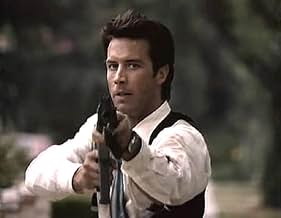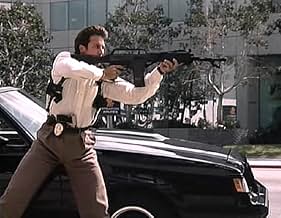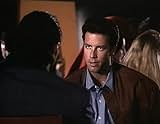IMDb RATING
6.0/10
2.8K
YOUR RATING
Tough Los Angeles cop Vincent Hanna takes on a gang of professional bank robbers led by the precise, enigmatic Patrick McLaren.Tough Los Angeles cop Vincent Hanna takes on a gang of professional bank robbers led by the precise, enigmatic Patrick McLaren.Tough Los Angeles cop Vincent Hanna takes on a gang of professional bank robbers led by the precise, enigmatic Patrick McLaren.
Juan Fernández
- Harvey Torena
- (as Juan Fernandez)
Sam J. Jones
- Jimmy
- (as Sam Jones)
- Director
- Writer
- All cast & crew
- Production, box office & more at IMDbPro
Featured reviews
Most people who see L.A. Takedown nowadays will see it for one reason: the fact that director Michael Mann remade this as Heat starring Robert DeNiro and Al Pacino in the Alex McArthur and Scott Plank roles. And that is basically the only reason why you would want to see this, unless you're an avid fan of '80 cop shows (there's even an detective-on-the-prowl-style montage).
When you watch this as I did (after seeing the brilliant Heat) you'll be pretty surprised by how much of L.A. Takedown went into Heat. From the opening heist to that famous coffeebar scene, a lot in both movies is identical, from characters to dialogue to camera angles. Most differences between both films are actually additions (which, of course, make Heat a good hour longer than L.A. Takedown). The Chris Shehirlis character (Val Kilmer in Heat) is basically an extra in L.A. Takedown as is the getaway driver for the bank robbery. Ah yes, the bank robbery. It's present here too, although of course, it doesn't last for nearly fifteen minutes (try three). Then whole subplots from Heat (for instance the one featuring Vincent Hanna's daughter) are absent and the ending is quite different, causing L.A. Takedown to lack the almost epic feel of Heat. Still, a lot of what is L.A. Takedown went on to become Heat.
And that's why L.A. Takedown merits viewing; to see how this film evolved from a cheaply made, averagely entertaining TV pilot show to what may just be the crime movie of the nineties. Many of the differences concerning the script I've already mentioned. The other main differences lie in acting and direction. To say that someone named Scott Plank (yes, plank) is not up there with Al Pacino is hardly surprising. But Plank is really pretty embarassing in this, coming across as someone who's copying crap TV-show acting like that from shows such as Hunter or Miami Vice. Even more embarassing is McArthur, who doesn't succeed in bringing any of his character's complexity to light (his character is actually pretty well developed in the script, which makes McArthur 'performance' even worseand it's the only character whose name was changed for Heat - don't ask me why). The rest of the cast isn't even worthy of comparison with their Heat counterparts.
As for directing, L.A. Takedown actually lookes pretty good, given that's it's a cheap TV movie. As said, some camerawork is very literally repeated in Heat (the opening heist is just one example), but L.A. Takedown is more coloured than Heat. Heat may be very stylised, the reality aspect of it was never looked over. In L.A. Takedown the stylism is present, but the realism takes a back seat, as dark streets and dim lights convey the traditional view of L.A. as a seedy place. But although the technical brilliance of Heat's cinematographer Dante Spinotti is clearly missed, L.A. takedown is visually not that bad.
In short: L.A. Takedown is not a good movie, and by itself not even remarkable. It is however a very interesting companion to Heat and both movies combined show that what you should remake is bad movies with unused potential, not good movies.
Rating: 4/10 (Heat: 9/10)
When you watch this as I did (after seeing the brilliant Heat) you'll be pretty surprised by how much of L.A. Takedown went into Heat. From the opening heist to that famous coffeebar scene, a lot in both movies is identical, from characters to dialogue to camera angles. Most differences between both films are actually additions (which, of course, make Heat a good hour longer than L.A. Takedown). The Chris Shehirlis character (Val Kilmer in Heat) is basically an extra in L.A. Takedown as is the getaway driver for the bank robbery. Ah yes, the bank robbery. It's present here too, although of course, it doesn't last for nearly fifteen minutes (try three). Then whole subplots from Heat (for instance the one featuring Vincent Hanna's daughter) are absent and the ending is quite different, causing L.A. Takedown to lack the almost epic feel of Heat. Still, a lot of what is L.A. Takedown went on to become Heat.
And that's why L.A. Takedown merits viewing; to see how this film evolved from a cheaply made, averagely entertaining TV pilot show to what may just be the crime movie of the nineties. Many of the differences concerning the script I've already mentioned. The other main differences lie in acting and direction. To say that someone named Scott Plank (yes, plank) is not up there with Al Pacino is hardly surprising. But Plank is really pretty embarassing in this, coming across as someone who's copying crap TV-show acting like that from shows such as Hunter or Miami Vice. Even more embarassing is McArthur, who doesn't succeed in bringing any of his character's complexity to light (his character is actually pretty well developed in the script, which makes McArthur 'performance' even worseand it's the only character whose name was changed for Heat - don't ask me why). The rest of the cast isn't even worthy of comparison with their Heat counterparts.
As for directing, L.A. Takedown actually lookes pretty good, given that's it's a cheap TV movie. As said, some camerawork is very literally repeated in Heat (the opening heist is just one example), but L.A. Takedown is more coloured than Heat. Heat may be very stylised, the reality aspect of it was never looked over. In L.A. Takedown the stylism is present, but the realism takes a back seat, as dark streets and dim lights convey the traditional view of L.A. as a seedy place. But although the technical brilliance of Heat's cinematographer Dante Spinotti is clearly missed, L.A. takedown is visually not that bad.
In short: L.A. Takedown is not a good movie, and by itself not even remarkable. It is however a very interesting companion to Heat and both movies combined show that what you should remake is bad movies with unused potential, not good movies.
Rating: 4/10 (Heat: 9/10)
Yeah I know every review will inevitably compare this film to its far bigger budget remake. Upon watching the two films back-to-back though I have to say that there are a few things I do enjoy better about this slimmer and more streamlined film than the more bloated HEAT.
For one, although I'm a huge fan of De Niro and Pacino, I found Scott Plank and Alex MacArthur much more serious and believable in their roles as far younger up-and-comers with something to prove. MacArthur especially exudes a calm intensity with a little more (albeit tactically restrained) fire under the collar than you'd usually see in a character like this.
Secondly, I love the supporting cast here. Instead of the likes of Danny Trejo, Jeremy Piven, and Hank Azaria, we get a little more of a B-crew with some solid work from character actors Juan Fernandez (SALVADOR), Cary-Hiroyuki Tagawa, and FLASH GORDON himself Sam J. Jones as some jerk at the bar. Instead of Wes Studi and Ted Levene, we get Richard Chaves (PREDATOR) and Daniel Baldwin. Perennial "that guy" character actor Xander Berkeley plays Waingrow much more as a sniveling wannabe than an actual tough-guy, but I think it actually works better and gives more menace to the character.
Oddly enough this film crosses over a lot with the cheeseball Spanish ABYSS knockoff ENDLESS DESCENT in that both movies feature Ely Pouget (who turns in some great work) as the leading lady and open with a shot of the protagonist coming out of a hangover with one foot sticking out from under the sheets. They were both made the same year too! Go figure.
TAKEDOWN sorely misses the violence, class, and action of HEAT but still has some pretty heavy stuff considering the budget and the time in which it was made. Mann handles the bank robbery as well as anything you would have seen on "Crime Story" and doesn't skimp on the weaponry in the big set-piece shootouts. I was actually delighted to see them cut out much of the romance and needless character development that HEAT got so wrapped up in (especially in terms of the cook/getaway driver, here played by an extra as opposed to the distractingly Allstate-ed up Dennis Haysbert).
There's a few plot differences, but not many as several scenes are line-by-line the same. The ending's a bit of a delight though and much more of a surprise than what we got in HEAT. My only beef with this film has to do with the bad sound and flat TV cinematography. Worth tracking down if you can find a decent copy.
For one, although I'm a huge fan of De Niro and Pacino, I found Scott Plank and Alex MacArthur much more serious and believable in their roles as far younger up-and-comers with something to prove. MacArthur especially exudes a calm intensity with a little more (albeit tactically restrained) fire under the collar than you'd usually see in a character like this.
Secondly, I love the supporting cast here. Instead of the likes of Danny Trejo, Jeremy Piven, and Hank Azaria, we get a little more of a B-crew with some solid work from character actors Juan Fernandez (SALVADOR), Cary-Hiroyuki Tagawa, and FLASH GORDON himself Sam J. Jones as some jerk at the bar. Instead of Wes Studi and Ted Levene, we get Richard Chaves (PREDATOR) and Daniel Baldwin. Perennial "that guy" character actor Xander Berkeley plays Waingrow much more as a sniveling wannabe than an actual tough-guy, but I think it actually works better and gives more menace to the character.
Oddly enough this film crosses over a lot with the cheeseball Spanish ABYSS knockoff ENDLESS DESCENT in that both movies feature Ely Pouget (who turns in some great work) as the leading lady and open with a shot of the protagonist coming out of a hangover with one foot sticking out from under the sheets. They were both made the same year too! Go figure.
TAKEDOWN sorely misses the violence, class, and action of HEAT but still has some pretty heavy stuff considering the budget and the time in which it was made. Mann handles the bank robbery as well as anything you would have seen on "Crime Story" and doesn't skimp on the weaponry in the big set-piece shootouts. I was actually delighted to see them cut out much of the romance and needless character development that HEAT got so wrapped up in (especially in terms of the cook/getaway driver, here played by an extra as opposed to the distractingly Allstate-ed up Dennis Haysbert).
There's a few plot differences, but not many as several scenes are line-by-line the same. The ending's a bit of a delight though and much more of a surprise than what we got in HEAT. My only beef with this film has to do with the bad sound and flat TV cinematography. Worth tracking down if you can find a decent copy.
This is the original version of what we now know as the modern classic Heat. If you watch LA Takedown and Heat, you will see many of the scenes paralleled. LA Takedown is not a great movie, but it does make an interesting companion to its superior counterpart. Worth watching for this reason alone.
It is great to see a low budget version of a great film. Michael Mann's 1995 masterpiece Heat was actually conceived way back in the 80s by the director Michael Mann. He decided to make it then with the limited budget he had. The scenes and even dialogues are verbatim but it is great to see what a bigger budget can get- from better thespians of the class of Pacino and Deniro to some amazing locations. This is a good film for film students to sit and analyze.
This movie has the same basic plot outline as Heat and MOST of the same characters, but is in NO WAY "scene-for-scene the same as Heat." The acting is absolutely atrocious and some of the scenes make no sense without some of the setup Heat has. I can understand why these actors haven't gone on to much beyond this movie -- THEY'RE AWFUL!!!!! Some of the storyline is just implausible and downright silly. I can also fully understand why this isn't available on DVD here in North America (the quality of this film is akin to what you might see on late night local television). However, if you're a die-hard Michael Mann fan, as am I, you should still see this, because it because it shows how much development he puts into a story.
Did you know
- TriviaHeat (1995) had 6 months of pre-production, and a 117 day shooting schedule. L.A. Takedown (1989) had 10 days of pre-production, and a 19 day shooting schedule. Michael Mann said that comparing one film to the other is like comparing "freeze dried coffee" to "Jamaican Blue Mountain".
- GoofsIn the exterior, after the bar scene when Hanna is following Lillian on the sidewalk, the boom mic shadow is frequently seen chasing above/behind the quarreling actors.
- Quotes
Detective Arriaga: [into phone/greeting] Raymond, you "Degenerate". Goodmorning.
Detective Arriaga: [louder] Raymond, wakeup!
Details
Contribute to this page
Suggest an edit or add missing content

